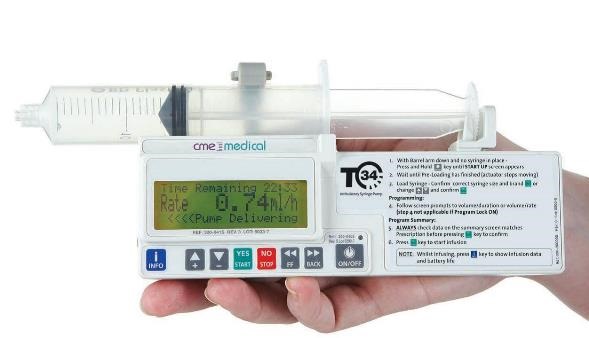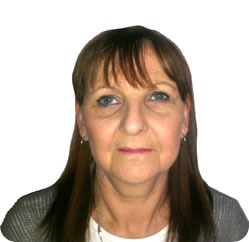Ambulatory pumps allow patients to continue receiving treatment or therapy away from a hospital, thereby leading a normal life during treatment. Due to the size and design of these pumps, patients can carry them around in a carry pouch.
Therapies that can be administered by ambulatory pumps, for example: analgesia, antibiotic or antiviral infusions, chemotherapy and hormone delivery.
Why have CME Medical recently launched an online mobile phone app for users of the company’s T34TM Ambulatory Syringe Pump?
We produce electronic and paper formats of user instructions for starting, monitoring and troubleshooting infusions with various versions based on the mode of operation of the pump.
The pump is frequently used in the home care and in-patient settings; therefore this type of resource assists users to be able to use the device safely and can be viewed as an asset to users.
This app is the mobile version of user instructions.

What does this app help with and what are the benefits of an online mobile app for medical devices?
The app is a resource following initial training. The user may use the pump infrequently, therefore user’s skill and experience in using the device safely and confidently may deteriorate over time, and the app helps bridge the confidence gap and acts as a prompt to safe use.
The benefits of an app format to the user is-
-
easy to use
-
can be used multiple times with no loss of quality (when comparing to a paper copy)
-
environment friendly
-
the apps simplicity sits nicely with the simplicity of the syringe pump itself
-
can be accessed with any type of mobile phone with internet connection
Is this app to be used in conjunction with the full operating manual and training or instead of traditional training?
The app needs to be considered as a quick reference guide following initial training. To address specific device training needs we provide both face-to-face and e-learning full training programmes.
How does CME Medical’s mobile user guide app compare to others on the market?
To be honest, we have not really compared our apps to other medical device companies that are on the market, we have based our app provision simply on what the users told us what they wanted and needed, maintaining simplicity and we worked with them to produce these.
Where is the app accessible from and is it free of charge?
The app is accessible from the CME Medical website and the internet address freely available for members of the sales and clinical support teams to customers. The app is free of charge whether a pump has been purchased or not.
How many people have downloaded the app so far?
The first app we produced is on-line and accessed with an Internet browser, to date, it has been accessed approximately 1,000 time which is an encouraging figure.
What feedback have you had on the app and do you think you will be launching an updated version?
The feedback so far has been very positive, words such as “useful” and “effective” have been associated with it when the app is used in conjunction with the pump.
Our team of Clinical Support Specialists are trialling its use during training sessions, so far, it is receiving good feedback from them and from training attendees.
How important do you think mobile apps will be in the future of medical device training?
I think there will be an increasing need for them. Over the last few years, the use of apps in the UK healthcare industry has been slower than in other industries; however the uptake of using mobile phones for work use is increasing momentum, particularly in the home care setting.
People are now fully used to using apps on a social basis and are now translating the positive usage of apps into the work environment
I think a clear distinction needs to be made on the intended use of apps in the healthcare industry. If apps are designed and introduced as (mHealth apps - mobile health) this may indicate that the apps itself is a medical device! Ours are not!
What are CME Medical’s plans for the future?
We intend to produce more user guide apps to accommodate the full range of CME Medical infusion pumps. An upcoming addition to this portfolio of apps is downloadable apps which negates the need for internet connection.
We are also looking at presenting our e-learning provision in a variety of ways. We already provide full e-learning training packages (traditional e-learning) and are working towards providing rapid e-learning apps.
The use of “bite-size learning” apps are highly suitable for the types of learning we want to be able to provide and give us the opportunity to provide resources which don’t take too long to produce and are relatively low cost.
When apps are designed well, they help reduce time out of busy work schedules to attend face-to-face training and there is increasing realisation that e-learning and apps are viable alternatives to face to face training.
In the recent past, the issue of Flash in mobile devices has created connectivity problems, the alternative of HTML5 is now universally supported on all types of mobile devices which help in quick and easy creation of content, this helps drive forward the momentum to create mobile apps for all the right reasons.
Where can readers find more information?
CME Medical website: cmemedical.co.uk
About Ruth Goodwin
 A Registered General Nurse (RGN) for more than 20 years experienced in critical care nursing, resuscitation and clinical training.
A Registered General Nurse (RGN) for more than 20 years experienced in critical care nursing, resuscitation and clinical training.
I gained several years of practical experience working as a critical care nurse in various public and private healthcare facilities both at home and abroad (Sultanate of Oman, Australia and Saudi).
On return to the UK I gradually moved into teaching of clinical skills in the NHS and obtained a degree in Quality Management and a Certificate in Business Studies.
I started employment with CME Medical as a Clinical Support Specialist, I have gradually moved onto designing and delivering face to face training programmes for devices and clinical applications and also developed skills in technical authoring, as a natural progression I moved onto e-learning design.